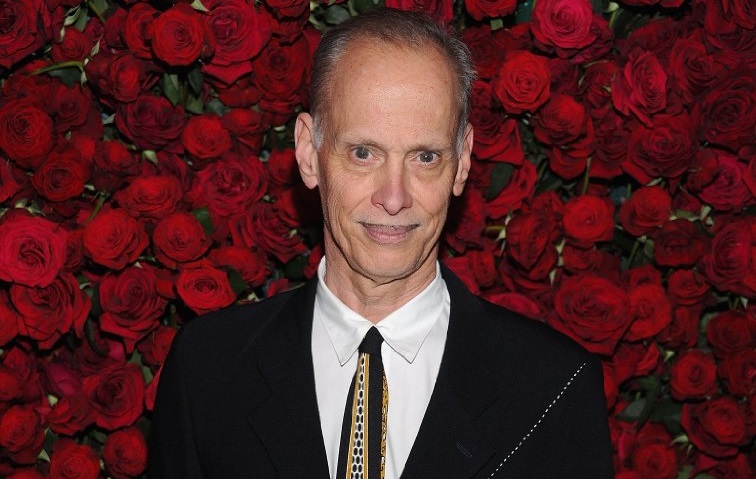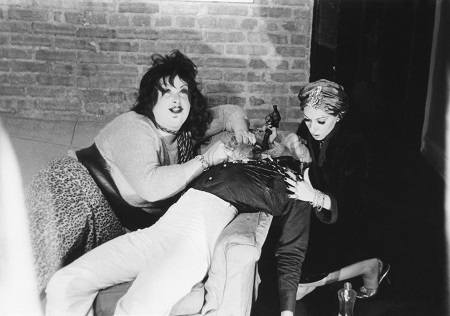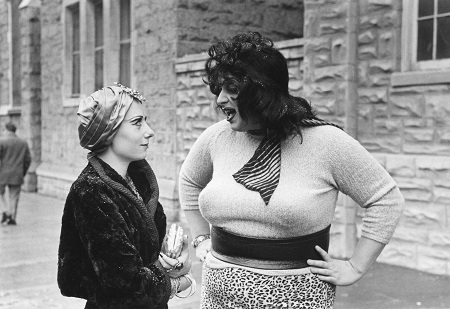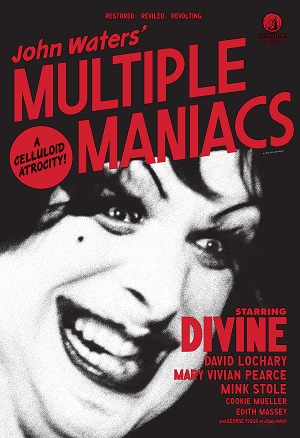
“Multiple Maniacs” – Interview with John Waters
by Sara Michelle Fetters - September 28th, 2016 - Interviews
Still Aghast
Legendary Filmmaker John Waters Talks Five Decades of Bucking the Status Quo
There are moments when it’s admittedly slightly difficult to maintain one’s professionalism when offered the chance at certain interviews. Such is the case when a film lover is gifted the opportunity to speak with a legend such as John Waters. His mark on cinema is as distinctive as his one-of-a-kind filmography, richly subversive works like Pink Flamingos, Desperate Living, Hairspray and Serial Mom more than speaking for themselves.
More than that, though, he helped change the way I personally looked at cinema, forced me to reanalyze what it could be and why. Along with his rambunctious, equally fearless troupe of Baltimore co-conspirators dubbed the ‘Dreamlanders,’ a group made up by the likes of Divine, Mink Stole, Mary Vivian Pearce, Vincent Peranio, Pat Moran and George Figgs (amongst others), Waters painted a pansexual picture that destroyed the status quo. His movies, as gross as they could be, as outlandish as they undeniably were, refused to bow to convention, especially as they pertained to gender, and for a youngster dealing with their own self-identification issues to say these were mind-blowing discoveries would be an obvious understatement.
So, yes, I was more than a little bit nervous when I picked up the phone to speak with Waters. Thankfully, that was something I was able to get over rather quickly, the vaunted filmmaker so gregarious and charming he put me at almost instant ease. The subject of our conversation was the restoration and re-release of his groundbreaking 1970 black and white suburban punk satire Multiple Maniacs, and with only 15 minutes to chat our conversation sadly didn’t traverse too much further than that. But we did get to look at least a little bit at his trailblazing career and why it is he hasn’t made a new film since 2004’s A Dirty Shame, his thoughts in regard to the current state of independent film particularly interesting.
Sara Michelle Fetters: First off, I have to ask, are you at all surprised that Multiple Maniacs has gotten a full restoration as well as a theatrical re-release courtesy of Janus Films?
John Waters: Not when we did it did I think it was going to. When we made the movie it was greeted with one bad review and absolutely no notice, and the last time I looked we were 100% favorable on Rotten Tomatoes, which is ludicrous, even I think.
The most shocking image in the whole movie is the Janus Films logo. When that comes on before the film starts, to me that is the most alarming image in the whole movie because the first art films I ever saw were by Bergman and Truffaut [and] it always seemed like they were from Janus Films.
Am I surprised? After being in this business for fifty years nothing surprises me. But I’m thrilled and happy because I was trying to get Multiple Maniacs released again and get some of the legal issues taken care of before I dropped dead, because then it would never happen. I was absolutely thrilled that Janus and Criterion, the class acts that they are, revived it in exactly the correct way, with the right sense of humor. They understood exactly what they were doing. I’m pleased about it.
Sara Michelle Fetters: It’s so weird, because for you and your career, people just kind of looked at your films and were just aghast, and now…
John Waters: I think they’re still aghast. I was at a screening last night. They laugh and they enjoy it, and I think seeing it though the time capsule that you’re now watching it with makes it even more bizarre in a way. But I think they’re still aghast in some ways, but in a good way.
Sara Michelle Fetters: Did you know, though, that you were going to be so far ahead of the times? The way that you were looking at cultural mores, sexuality, gender; all of that stuff?
John Waters: No. We were just making a movie that reflected the sense of humor that me and my friends had. Just like every kid that makes a movie you make them with your friends. My friends were a little more mixed, a little more extreme and little more brave. At the same time, when you’re 24-years-old you don’t really think about when you’re going to be 70-years-old. I look at [Multiple Maniacs] now and I just wonder how did I ever get that made? How did I do that? What was I thinking about?
My parents used to say, all parents say to their children when they’re going wild, ‘What are you thinking?’ That’s a fair question. My parents never saw Multiple Maniacs. When I saw it again recently, I’m glad they didn’t. It’s not the movie you want to sit there with your parents watching.
Sara Michelle Fetters: That is true. I will say, though, as a young kid growing up in Spokane, Washington in the 1990s, finding these VHS tapes of your films when I was exploring my own gender and my own sexuality, and seeing Divine and Mink Stole in these outlandish films, it kind of changed my life.
John Waters: I’m happy with that, I think that’s great. My favorite story on that front, this is the best story ever like that, is that I got a letter from a woman saying, ‘You saved my life because I never looked at my own anus or thought about it, and after I saw Pink Flamingos with the guy with the singing asshole, I looked at mine and saw something was wrong and went to the doctor and I had rectal cancer and I got it cured.’ Pink Flamingos was responsible for her health.
That one took my breath away. And it’s true. I didn’t make that up.
Sara Michelle Fetters: These films, not just the early ones, could you have done any of this without your fellow Dreamlanders?
John Waters: No, nobody could. They were game, they were all brave; it was like group madness. It was like a political action, in a way. It was like a terrorist act of humor. No, I could not have done it without them.
Last night we had a big screening in Baltimore, and Mink Stole was there, and Pat Moran and Vincent Peranio, who did the production design, and George Figgs, who played Jesus. I’m still friends with all the ones that are alive, certainly. Mary Vivian Pearce lives in Nicaragua, but I’m still friends with her, too.
Sara Michelle Fetters: Revisiting Multiple Maniacs, it feels like a lot of commentary, especially as it concerns suburban malaise; it’s almost like we’re having some of those same discussions right now. They’re once again back in the political and public zeitgeist.
John Waters: We are. Definitely. But then at the same time, the shocking stuff, when they are all saying ‘Off the pig!’ and Divine is going after policemen and stuff, certainly even the most radical movement today would not say ‘Off the pig!’ But certainly, at the time, that was a common shout at peace marches, if you can imagine. That part is even more alarming I think today. It was a Punk Rock movie, that’s all, just nobody knew about Punk. It hadn’t happened yet.
Sara Michelle Fetters: Could you make a movie like this today? I don’t mean the subject matter. I just mean the way that you funded it, the way that you guys got it off the ground, the sheer chutzpah that it took to just throw this kind of stuff together.
John Waters: I think you probably could. It would be different. You would make it on your cell phone. It would be the same way and you’d have to find somebody to pay for it. My father paid for [Multiple Maniacs]. I paid him back, every penny of it, but he never saw it. He would have been horrified. I do think he was hoping I wouldn’t pay him back. That way he’d never have to give me any money again.
But, I think it could be made today. Certainly when I went – you couldn’t go to film school and make that movie. Today you could. Today you could definitely go and make the most outrageous movie ever.
How would it be shown? That’s the issue today. When this came out there were not even Midnight Movies yet, and there was certainly no online presence. There was no YouTube, there were no computers of any kind. There wasn’t even video. The only way you could see the movie was to nurse its release in theaters. Art Theaters are having a lot of trouble today. Is there even a Midnight Movie today that comes out and makes its name for itself? A new movie? I don’t think there is. I think it’s very hard to.
The problem is, a movie is not going to have 47 years to make it. Because Multiple Maniacs, when it came out, did not make it. Yet here we are now. Pink Flamingos was the first one that really had any commercial success at all. This one was training wheels for Pink Flamingos. I mean when Divine eats that heart, that is training wheels for eating the turd. Really. It was a dress rehearsal.
You see it today and you see Divine, who was in real life so unlike that character. Divine was a nerd in high school that got beat up and everything. I think he used all that anger and everything that he had to create this character of Divine, the homicidal maniac.
But Multiple Maniacs was made at the height of peace and love, so it was a very trippy, incorrect humor. But the hippies that came to see it liked it and they turned into punks. The gay people that came didn’t fit in with the other straight normal world people. Straight then didn’t mean it heterosexual, it meant you didn’t take drugs. Even the word straight means something different today than it did then.
Sara Michelle Fetters: When you look at the state of LGBT films today, do you feel like you had a part in giving birth to all that’s happened over the last 40-plus years?
John Waters: I think I did. I don’t think that I did that on purpose. Are my films gay films? I don’t know. Sort of they are, but straight people always came to them, too, and some gay people didn’t like my movies, to be honest. It really depends. But I think I did, yes. Even if you hate my films I think you say they did have an influence. I think Divine made all Drag Queens be hip now. There aren’t square Drag Queens anymore. Not that many. Before Divine came out they all were square. They wanted to be Miss America, they wanted to be their mother. Today they all have an edge and I think Divine had something to do with that.
Sara Michelle Fetters: On that, when you look at transgender representation in film, in television, just in the news, what do you think?
John Waters: First of all, Divine was not the slightest bit transgender. He never dressed as a woman, he had no desire to be a woman. He wanted to pass as a monster, not a woman. He wanted to be Godzilla, not Jayne Mansfield. But he did like Elizabeth Taylor. He did like her a lot.
I look at it all a little bit sideways. I always think that it’s hard for me to imagine why they have a Gay Pride Parade in New York. I mean, is anyone hassled for being gay in New York City? In Provincetown, I would think, why don’t they have a Hetero Pride Parade? They seem like the minority. And I find humor in that. I really do. I find humor in the strangest things. I think my whole life is a trigger warning. Multiple Maniacs is a giant trigger warning. They should change the title to ‘Trigger Warning,’ basically.
I don’t understand people that can’t have a sense of humor about any of this. When I do my spoken word shows I always make fun of ‘gayly correct’ thoughts, even though I think I am politically correct and gayly correct. I make jokes that transgendered people have gotten their rights faster than any minority in the history of minorities. I also believe that anti-gun laws are more important than transgendered bathroom laws because I don’t think anyone should be shitting in public. Gay, straight, men, women, transgender. Shit at home. Disgusting to be shitting outside. Aren’t you trained? Aren’t you housebroken? Let’s work on common sense gun laws, not who can use which bathroom where and when.
Sara Michelle Fetters: Why haven’t you made a new film since 2004?
John Waters: Well, I’ve had three development deals that didn’t happen. They paid me Hollywood money to write one children’s movie called Fruitcake. Two Hairspray sequels, one of them on HBO that just didn’t happen. I’m not bitter at all about it. I think the independent film business is the worst it’s ever been and I think TV is better than movies now. I think that’s an issue. But my books? Both my last two books did better than my last two movies.
I just go to whatever place wants me to tell a story. They’re all equally the same to me. I write my movie, I write my books, I write my spoken word shows. To me, one is not more important than the other. I still have meetings about making movies, but I recently signed a two-book deal because that was definite.
Sara Michelle Fetters: Quick silly question. They gave Roger Corman an honorary Oscar a couple years ago. Would you take one?
John Waters: Of course I would! This year I got two honorary doctorates of arts from Rhode Island School of Design where I gave the commencement speech, and that’s going to be a book next year called Making Trouble. I’ve got one from the Maryland Institute. I’m like the Scarecrow when they give him the brain in The Wizard of Oz. So, sure, of course I would. I’m a voter. I’m in the Academy. I vote for all the Oscars. I’d love one of my own.
Sara Michelle Fetters: At the end of the day when you look back at your films, what do you take away from it all?
John Waters: I looked at [Multiple Maniacs] last night because I had the Baltimore premiere, and it was a sold out audience and I’m watching it and thinking so many thoughts. When it showed in Provincetown, I was leaving the theatre and some young guy in the audience just looked at me and whispered as he was walking out, ‘The acid must have been pretty good back then.’ The answer is yes. I’m glad I went through all that. I’m proud that I have this very flawed movie that is, in a way, is a remembrance of what we were all like when we were young, and I’m thrilled that I’m still friends with every person that’s alive in that movie. I feel lucky, I’ve had a wonderful career for almost fifty years doing what I wanted to do when everybody told me you couldn’t.
Sara Michelle Fetters: Finally, what would be the advice to young filmmakers, whether they be straight, gay, lesbian, trans, whatever. When you give them advice, what do you tell them?
John Waters: I’d tell them to make sure they reject separatism of any kind. Gay isn’t better or worse, black or white. Everybody hanging around with everybody else, do that and you will become a much more well-rounded person. They should sentence racists to world travel, even though that’s rather impractical. The more you travel and the more people you meet, you can’t be racist, you can’t be stupid because you learn how every other person lives and you adapt. The more you leave your neighborhood, the more you leave what you were taught to believe and explore, the smarter you’ll be.
– Review reprinted courtesy of the SGN in Seattle







